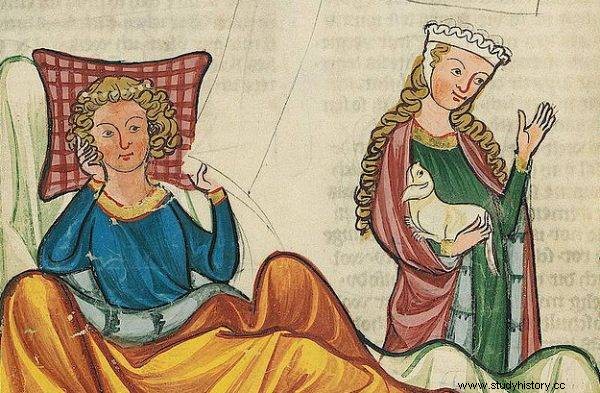In the Middle Ages, virgins were a valuable commodity, and their purity could work wonders - for example, attract unicorns. Therefore virginity was kept at all costs.
It also happened that a young woman did not take care of her virginity enough, and finally the wedding day arrived. Even then, however, not all was lost. It was possible to have her considered a virgin at a crucial moment.
You just had to know who to ask about. One of these knowledgeable people was a remarkable woman named Trotula. She was able to advise on many important matters. Seriously, it was effective advice.
Trotula of Ruggiero
Trotula of Ruggiero was an 11th-century medic who left behind a tract specifically targeted at women . It is not known whether she wrote it herself or compiled it, but she did provide a lot of information on gynecological ailments and other problems. Matters that were usually difficult for women to raise in conversations with men.
It was entitled De passionibus mulierum Curandarum , that is On the treatment of female diseases . Although it was largely related not to real diseases, but to minor ailments, it was over the years very popular and was taken seriously. Even though some of that advice sounded rather strange.
Read also:Medieval family strong faith and offspring. What was the sex life of people like in the Middle Ages?
Vaginal constriction
Trotula was quite ingenious about ways to "pretend" to be virgin. Two of them had reliably convinced her husband that he had married a woman "intact", although that was not the case at all.

It also happened that a young woman did not take care of her virginity enough, and finally the wedding day arrived.
The first method was to reduce the lumen of the vagina so that it could pass virgin . Trotula has given some recipes for how to do this, but I strongly advise against using them today. Especially that the one quoted below required a longer administration of the drug and a large supply of unspeakable alternatives.
How to tighten the vagina so that a woman can pass for a virgin.
Take the egg whites and mix them with the water in which the mint was previously cooked, pour over the mint and similar hot herbs. Dip a new linen cloth in this later and put it in the vagina, changing two or three times a day . Also after you urinate at night. Remember that the vagina should be washed well beforehand with the same warm water in which you soak the cloth.
In fact, it might have been helpful, although the enigmatic approach to herbs definitely lowered the value of the council. As if it wasn't necessarily about support. Ultimately, if a woman slips anything into her pinkness, she should know exactly what it is.
Also read:Was orgasm a sin in the Middle Ages? That's how sex was treated 800 years ago
Trial and Error
And it is the same with washing intimate places. Acting blindly may end up uninterestingly, sometimes even fatally. Not to mention the fact that for a woman who was not very proficient in herbal medicine, the whole operation might simply have failed, which did not bode well for the marriage.
If the woman was unfamiliar with herbs and had no one to ask about it, she could have used another recipe from Trotula. The latter was simpler, did not require so much preparation and could work even in the case of a short or early marriage date .
Take natron or dried blackberry powder and slide it inside; it narrows down wonderfully.

The text is an excerpt from the book "The Secret Sexual Life of Women in the Middle Ages" by Rosalie Gilbert, which has just been published by Rebis.
Natron is a native soda that occurs in nature, for example in lake sediments. It might be available in the city, but not necessarily in the countryside. Unless there was a suitable lake in the area.
What poorer women didn't have any baking soda in the kitchen, but they could look for blackberries, which usually cost nothing. Only that again we find imprecision. The recipe does not explain what part of the blackberry was meant. Leaves? Stalks? Fruit? Probably by trial and error, things did not always work very well.
Read also:Top 5 Tips for Pregnant Women in the Middle Ages
Rinse for "intimate parts"
When a woman who wanted to become a virgin had access to more exotic products, she could go for one more way which was much clearer, although it required a lot of money:
To do this differently, take ounces of oak apples, rose, sumac, plantain, comfrey, bolus, alum, and bleaching clay. Boil it all in rainwater and then wash the intimate parts with the liquid.
With such a treatment, the bolus gave the lower lips the color of fresh pink, roses in turn added fragrance, comfrey and whitening clay softened the astringent properties of alum. And if that wasn't an option, you could still pretend.
Cheated bleeding
If the narrowing of the vagina was unsuccessful or the narrowing was insufficient, another idea from Trotula could be used. This time it was about engraving a bloody mark that should be a sign of losing one's virginity during the first intercourse .
This was to be ensured by leeches placed behind the labia the night before the wedding. Trotula also emphasized that you should not let such leeches too far, although I have no idea how to do it properly. Putting on a collar and putting it on a bow? Such leeches were to be left behind ...
[…] a blood clot that will cheat the man.

If the narrowing of the vagina was unsuccessful, or the narrowing was insufficient, another idea from Trotula could be used.
This would be proof of the expected innocence of the fiancée and, in theory, everything could have turned out well. There were, however, side questions, such as how to explain the presence of a jar of leeches in the bedroom. Or, possibly, send out an unruly leech that has gone astray.
Trotula did not mention removing the leech before intercourse, but it was probably the default. If she detached herself from her mistress and clung to her husband's penis , it could raise some uncomfortable questions.
Read also:The priest and his wife. Sexual life of medieval clergy
Ground glass in vagina
Even more disturbing was the suggestion to provoke bleeding by using ground glass pomade and dye. It had to be inserted into the vagina before intercourse.
Something tells me that the dye was completely unnecessary in this situation, as the mere presence of glass particles could cause completely natural bleeding . And if something was really wanted at the time, it was some way of stopping the bleeding. Not to mention the "bleeding penis" bonus.
Trotula mentioned that the latter method was used by prostitutes who wanted to appear virgins, but without a doubt the idea was not the prudent one.
The Dangers of Virginity
Being a virgin wasn't just about consistently refusing to go down. In the case of adolescent virgins, it involved learning all the things that would be useful in the future, like managing the household and doing various female jobs.
Usually this happened under the guidance of someone with adequate experience in pursuing the primary goal of a virgin's life, marriage. And she could only wonder if she would end up with an old and unattractive husband, or someone she would love.

Being a virgin wasn't just about consistently refusing to go down.
The elderly virgin had to keep the purity away from rape, which could either be an accidental attack or could have happened deliberately for the purpose of being forced into marriage. When something like this happened, the perpetrator was expected to marry the victim.
It could also be a peculiar way of forcing the maidens who had previously rejected the suitor, or even a conspiracy against the reluctant parents of the chosen one.
It happened that a woman staged her kidnapping with subsequent rape herself to put her parents in a dead end situation. They had to consent to the marriage of their "tainted" daughter. It is definitely a good thing that this issue is now a thing of the past (…).
Read also:Pure sinner and dirty saint. How often did women bathe in the Middle Ages?
Going alone
Even more nasty was the widely held belief that old virgins were naturally lustful. In general, women were considered more sensuous than men at the time, which created a kind of obsession. For example, it was believed that the intensity of lust could be determined by examining a woman's urine (…).
Fortunately, many medical treatises have approached the problem of extinguishing inappropriate longings of the body with delightful optimism. For example, Paenitentiale Theodori , that is, Theodore's Penance , written by Archbishop Theodore of Canterbury before 700, expresses only a slight annoyance at the actions of those who take matters into their own hands.
Masturbation? How free, only three weeks of penance . In the case of women:"If a woman [...] commits a lonely crime, she should do penance at the same time."
In this respect, men and women were equals both in terms of actions and the punishments for them.
Source:
The text is an excerpt from the book "The Secret Sexual Life of Women in the Middle Ages" by Rosalie Gilbert, which has just been published by Rebis.
